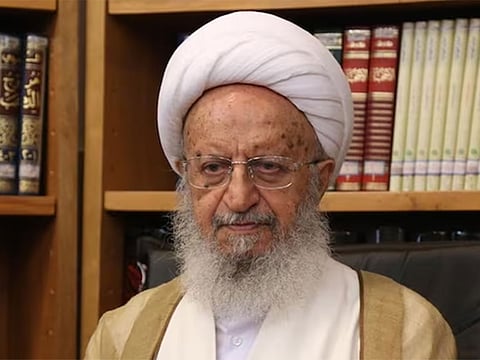Iran’s top cleric issues Fatwa declaring Trump and Netanyahu ‘Mohareb’ or enemies of God
The fatwa calls on Muslims worldwide to unite against the two leaders

Dubai: Iran’s top Shiite cleric, Grand Ayatollah Naser Makarem Shirazi, has issued a fatwa declaring US President Donald Trump and Israeli Prime Minister Benjamin Netanyahu as “enemies of God.”
The fatwa calls on Muslims worldwide to unite against the two leaders, accusing them of threatening Iran’s supreme leadership and waging war against Islam.
Makarem’s decree, reported by Iran’s Mehr News Agency, describes any individual or regime that poses a threat to Iran’s Supreme Leader or top clerics (Marja) as a “mohareb” — a term used in Islamic law to denote one who “wages war against God.”
Under Iranian law, being labelled a mohareb carries severe penalties: execution, crucifixion, amputation, or exile.
“Any person or government that harms or threatens the Leader or a Marja is a mohareb and must be treated as such,” Makarem declared, invoking Islamic law to justify violent retribution.
The fatwa explicitly forbids any form of cooperation or support for the US or Israel, calling such acts “haram” (religiously forbidden). It urges Muslims globally to make these “enemies” “regret their words and actions,” and promises divine reward for those who suffer or make sacrifices in opposing them.
The timing of the fatwa is significant. It comes in the wake of the so-called 12-Day War, which erupted on June 13 when Israel launched surprise airstrikes inside Iran, reportedly targeting high-ranking military officers and nuclear scientists.
Tehran retaliated with ballistic missile attacks on Israeli cities. The conflict quickly escalated when the U.S. joined Israel, striking three key Iranian nuclear facilities. In response, Iran bombed a U.S. airbase in Qatar, pushing the region to the brink of all-out war.
In a separate statement, Ayatollah Makarem issued a chilling warning: “Anyone who harms Supreme Leader Ayatollah Ali Khamenei deserves the death penalty.”
Though fatwas are religious edicts, they are binding for devout Muslims and often carry grave real-world implications. They do not require state enforcement; individual believers are expected to act on them — a dynamic that has led to violence in the past.
The most infamous example remains the 1989 fatwa against author Salman Rushdie following the publication of The Satanic Verses. That decree led to the murder of Rushdie’s Japanese translator and violent attacks on his publishers. Rushdie has lived under threat ever since — surviving a near-fatal stabbing in 2023 that left him blind in one eye.
Makarem’s fatwa now signals a dangerous new phase in Iran’s use of religious authority to sanction violence on a global scale.
“The West must realise,” he wrote, “the Islamic Republic is not only targeting its own people — it is preparing for global violence in the name of religion.”
As tensions continue to rise, this edict adds a potent ideological charge to an already volatile geopolitical crisis.
Sign up for the Daily Briefing
Get the latest news and updates straight to your inbox



